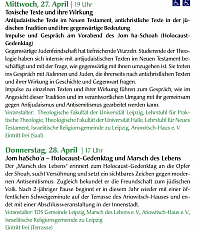Aktuelles
Winter School: “Sexualit*ies and Gender(s) in the Early
Writings of Judaism, Christianity, and Islam”
STANFORD UNIVERSITY
19 – 21 November 2024
Winter School
Sexualit_ies and Gender(s) in the Early Writings of Judaism, Christianity, and Islam .pdf
(1,9 MB) vom 30.09.2024
Toxische Texte und ihre Wirkung
Mittwoch, 27. April, 19 Uhr
Jom haScho’a - Holocaust-Gedenktag und Marsch des Lebens
Donnerstag, 28. April, 17 Uhr

Veranstaltungen am 27. und 28.4.
Architexture:
Textual Representation and Practices of Sacred Spaces in the Ancient World
Veranstaltet von Annette Weissenrieder (Halle-Wittenberg), Jan Stenger (Würzburg) und Martina Kepper (Marburg).
Ort: Frankfurt und online
Termin: 14./15.10.21
Für eine online-Teilnahme melden Sie sich bitte an bei:
paulien.wagener@izp.uni-halle.de
Tagungsprogramm
Programm Frankfurt (A4 Document).pdf
(963 KB) vom 04.10.2021
Oberseminar: Recht, Gesetz und Gerechtigkeit im Neuen Testament im Lichte hellenistischer Kultur
Veranstaltet von Annette Weissenrieder (Halle-Wittenberg), Stefan Krauter (Zürich) und Karl-Wilhelm Niebuhr (Jena)
Ort: Zoom
Termin: 16./17.04.2021 und 21.04.2021
Programm
Programm Oberseminar 16. und 17.4..pdf
(35,8 KB) vom 09.04.2021
Workshop:
Reconsidering the Letter to the Ephesians in Ancient Contexts
This workshop will explore the letter to the Ephesians in terms of Greek philosophy and science, epistolography, and ancient Judaism(s).
Some questions that arise for this workshop: What are the relevant conceptualities and terminologies that mark the letter’s philosophical, cultural, cultic, architectural and religious contexts? In what way is Ephesians dependent on the Pauline letters and on Colossians? What then is Ephesians’ understanding of Christian existence? What is its relationship to Judaism?
The workshop will consider these questions from new angles, bringing to them the perspective of a professional historians of ancient philosophy and science, specialists of ancient Judaism, and the New Testament.
Friday, November 29th
Flyer Workshop
Flyer NT Querformat ganz neu.pdf
(1,8 MB) vom 28.11.2019
Call for Paper
Prayer and the Ancient City: Influences of Urban Space
The Martin-Luther-University Halle-Wittenberg will host the conference “Prayer and the Ancient City: Influences of Urban Space”, which will run from January 23 to 25, 2019, organised by Annette Weissenrieder, Maik Patzelt and Jörg Rüpke. The conference aims to cross disciplinary borders and has therefore invited experts from various fields, including Jewish Studies, Early Christian Studies, Theology, Ancient History, Classical Philology or Religious Studies and Cognitive Studies. The following researchers have already agreed to deliver a paper: Brouria Bitton-Ashkelony (Jerusalem), Yair Lipshitz (Tel Aviv), Uffe Schjoedt (Aarhus), Jörg Rüpke (Erfurt), Gerard Rouwhorst (Tilburg), Andrei Timotin (Bucharest), Stefan Schorch (Halle), Catherine Hezser (London), Ra'anan Boustan (Princeton), Cornelia Horn (Halle) and Annette Weissenrieder (Halle).
The workshop is a first attempt to investigate the impact of urban space on prayer practices and related religious thought and belief in antiquity. Possible areas of enquiry include the following:
(1) How do religious groups embed themselves within the topography of a city? How do they deal with and support the religious diversity of a city, and to what extent are they affected by such diversity? To what extent do these groups, and particularly readers within them, communicate new ideas designed to cope with the city environment? The destruction of the Second Temple in Jerusalem might be an example: religious groups had to compensate for their loss by creating new imaginaires of the city and its sacred places, which in turn affected worship strategies, the formation of belief, etc.
(2) According to urban sociologists, both diversity and density in the various spaces of a city lead to interaction and exchange among religious groups or networks and enlarge the scale of personal religious choices. We would like to investigate the city as a melting pot impinging on practices and beliefs that in turn affect the ways of prayer. Conceptual tools to that end might include de Certeau’s concept of appropriation, or relevant notions of intersubjectivity and negotiation.
(3) Another interest might be the formation of normative discourses. As indicated in a) and b), city spaces as spaces of creative action give rise to new practices that in turn evoke new imaginaires. Such practices and their corresponding imaginaires are highly contested. The competing imaginaires, whether in narrative or dramatic form, images or architecture, evoke processes of grouping and differentiation that involve the negotiation of spatial imagining, and sometimes lead to open conflicts. Here we think for example of philosophers and church fathers, who provided alternative ways of using city spaces with implications for new forms of prayer or belief supporting the formation of a non-diverse group in a city of diversity.
We encourage doctoral students and postdocs to present their research in short pre-circulated papers. Any topic on the theme “Prayer and the Ancient City: Influences of Urban Space” is welcome. The language of the conference is English. If you are a doctoral student or a postdoc and would like to contribute a written text to the conference, contact Maik Patzelt at maik.patzelt@uni-osnabrueck.de. Include your name, current position, and an abstract of no more than one page, including sources and a short bibliography, by August 19, 2018. If your proposal is accepted, we will provide for your accommodation in Halle and travel expenses.
Call for Paper: Prayer and the Ancient City
Prayer and the Ancient City .pdf
(51 KB) vom 02.08.2018




